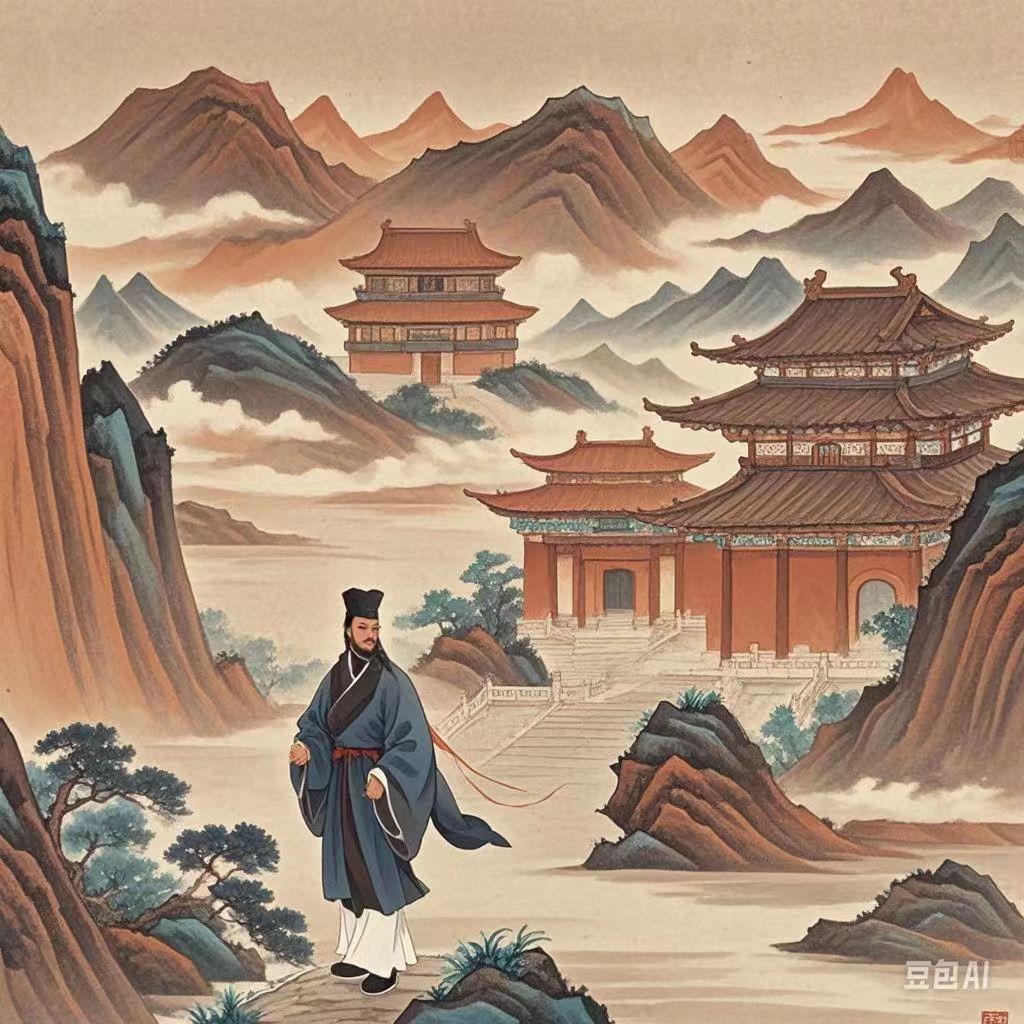In the vast world, there was an elderly Taoist priest named Yunxi, who lived by a narrow mountain path far from the hustle and bustle of the world. This mountain was shrouded in mist, where the mountains and the sea intertwined, like a mysterious barrier between heaven and earth. Every day, Yunxi practiced in solitude, listening to the wind and watching the clouds, deeply understanding the philosophy of "see the mountains and the sea, and see yourself." His cultivation was not just about regulating the flow of energy within his body, but also about awakening his soul and harmonizing his inner and outer worlds.
One day, Yunxi received a letter from a young man living in the city. The young man had grown up in the noisy urban world, his mind and body weary, and his heart filled with confusion. The letter read: "I have heard that Taoism offers a path to inner peace. I humbly ask the master how I might find my true self?"
Yunxi smiled lightly, placed the letter gently on his desk, and turned his gaze to the distant mountains and seas. The view often made him reflect on one question: "Isn't the external world a reflection of the inner world? If one can see the mountains and the sea, can they also see the true self within?"
Deciding to personally meet the young man, Yunxi prepared a beautiful mobile wallpaper for him. The image depicted a vast and peaceful landscape of mountains and sea, with the sea breeze gently blowing and the mountain peaks stretching far and wide. It was as if the viewer could enter another dimension of reality. Yunxi believed that this wallpaper would serve as the young man's guide to a soul journey.
When Yunxi finally met the young man, he handed him the phone with the wallpaper and said, "Young one, this is not an ordinary picture; it is the journey of your soul. Begin with this mountain and sea. Quiet your mind and feel the tranquility it brings. It reminds you that the external mountains and seas and your inner mountains and seas are interconnected. Only when you truly see yourself can you walk out of confusion and find your own path."
The young man took the phone and gazed at the wallpaper. A deep calm he had never felt before began to fill him. As he stared at the vast landscape, the scene seemed to change before his eyes: the sound of the waves became the murmurs of his inner thoughts, and the contours of the mountains grew clearer. Almost unconsciously, he began to reflect on his past and why he had become lost, what had led him to his anxiety and confusion.
Seeing this, Yunxi nodded gently and said, "The wisdom of Taoism is like this landscape. The external world and the inner world echo each other. Cultivation is not necessarily about leaving the world behind in physical seclusion. It can also happen in every seemingly ordinary moment when you converse with your soul. You can find tranquility in the great mountains and seas, and you can also return to yourself amidst the noise of the city."
From that day on, the young man set the wallpaper as his phone’s background, and every morning, the first thing he saw upon waking was this peaceful scene. It filled him with a sense of calm and strength. Gradually, he realized that his confusion stemmed from his over-reliance on the external world, and that true liberation came from awakening his inner self.
As time passed, the wallpaper became not only a guide for his soul but also a symbol of his practice. He studied Taoist teachings, contemplating the truths of "wu wei" (non-action) and "dao fa zi ran" (the way of nature), and slowly, he began to let go of his inner attachments, accepting the changes and impermanence of the world. He learned to reconcile with himself.
Eventually, in one moment of deep contemplation, the young man grasped the essence of Taoism: "The Tao that can be told is not the eternal Tao; the name that can be named is not the eternal name." He understood that the journey of the soul was not a search for something external, but a return to the self. In this mountain and sea, the most important thing was not to see anything, but to "see yourself."
The wisdom of Yunxi and the mountain-sea wallpaper became his guide on the path of cultivation. In this journey of the soul, he finally found his inner peace and true self. As Taoism teaches, "The vastness of the sea is not in the depth of the ocean, but in its capacity to embrace all things."
Moral of the Story:
In this chaotic world, mobile wallpapers are not just decorations—they can also serve as a mirror to our souls, guiding us to discover inner peace and strength. Taoism teaches that the world and the soul are reflections of each other. Only through stillness and self-reflection can we see the true self in the mountains and seas of the external world.See Yourself Mobile Wallpaper。
I recommendhttps://mall.taoismtop.com/%E8%A6%8B%E8%87%AA%E5%B7%B1-%E6%89%8B%E6%A9%9F%E5%A3%81%E7%B4%99



